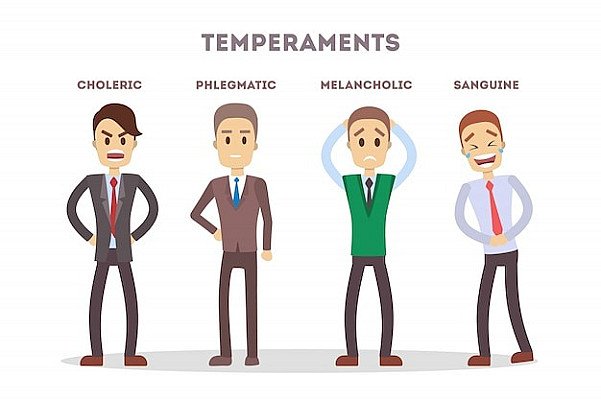Esteemed readers, this we would like to present to you a section from the book "Career Guide" authored by Eyvaz Gocayev. This particular excerpt contains valuable information that we believe will be beneficial for you to explore.
Aligning Temperament Types with Suitable Career Paths
It is important for a person to know his nature, character and general psychological characteristics in order to determine which profession he is suitable for. From a psychological point of view, in order to know a person more deeply, it is considered important to determine what type of temperament he belongs to.
Temperament can be categorized into four distinct types:
1. Sanguine
2. Choleric
3. Melancholic
4. Phlegmatic
Each temperament type has pros and cons, weaknesses and strengths.
I. Characteristics of Sanguines - Sanguines are noted for their quick and emotional behavior. This type of people cannot stand in one place for a long time and are constantly on the move.
- They are averse to challenging and demanding tasks.
- They possess a strong belief in their ability to succeed in their work.
- They tend to withdraw easily when confronted with difficult situations.
- They consistently maintain a positive appearance.
- They exhibit high levels of energy and enthusiasm.
- They have a knack for finding enjoyment even in the most challenging tasks.
- They actively inspire and motivate those around them to work.
- They often hold leadership roles in various associations.
- They excel at motivating and uplifting individuals while working.
- Due to their helpful and accommodating nature, sanguine individuals readily volunteer for any task and are willing to undertake any job offered to them.
Potential career paths well-suited for individuals with a sanguine temperament include:
- Teacher
- Sales specialist
- Public relations professional
- Human resources specialist
- Marketing and advertising professional
- Journalist
- Psychologist
- Lawyer
II. Characteristics of Melancholics - In contrast to Sanguines, Melancholic individuals tend to be reserved, introverted, and hesitant when it comes to adjusting to new surroundings. They often speak softly and struggle with effective communication. While Sanguines are known for their chattiness and Cholerics for their assertiveness, Phlegmatics for their observant nature, Melancholics are characterized by their thoughtful and strategic thinking.
- Melancholic individuals often gravitate towards careers in writing, art, and music.
- They possess inherent intelligence from birth.
- Their creativity is a notable characteristic.
- Due to their methodical and systematic thinking, they demonstrate meticulous attention to even the minutest details in their work.
- They have a knack for identifying problems, analyzing them, and finding appropriate solutions.
- Despite a tendency towards laziness, when they undertake a task, they strive to execute it with excellence.
- They are inclined towards structure and pay great attention to details.
- They exhibit a strong commitment to completing tasks they have started.
- They hold themselves to high standards and display a perfectionistic approach.
- Graphs, lists, drawings, and plans play a significant role in their lives.
- They prefer working in an organized environment.
Potential career paths well-suited for individuals with a melancholic temperament include:
- Managers
- Extraordinary leaders
- Leaders
- Business management staff/Analysts
- Designers
- Officers
- Entrepreneurs
- Writers
- Researchers
- Artists
- Photographers
- Architects
- Philosophers
- Poets
- Writers
- Those who work in finance or banking
- Economists
III. Characteristics of Phlegmatics - Phlegmatic individuals are notable for their composed and patient demeanor. They tend to avoid excessive communication and possess a reserved nature. They exhibit a consistent and discreet approach within the work environment.
- - They adhere strictly to rules and requirements.
- They demonstrate strong organizational and competency skills.
- They avoid wasting time on unnecessary tasks.
- They maintain a peaceful demeanor.
- Their strong management abilities stem from their caring nature towards others, treating everyone equally.
- They exhibit patience in completing tasks they undertake.
- They possess the ability to approach problems comprehensively.
- They tend to be conflict-free individuals, avoiding the creation of enemies.
- They are capable of working effectively even under challenging conditions.
- They value individuals based on their education, knowledge, and work ethic.
- They refrain from interfering in the work of others.
Potential career paths well-suited for individuals with a phlegmatic temperament include:
- Accountant
- Librarian
- Web designer
- Information technology specialist
- Laboratory technician
- Pharmacist
- Teacher
- Military or police officer
- Lawyer
IV. Characteristics of Cholerics - Choleric individuals, similar to Sanguines, tend to be impatient and talkative, making it challenging for them to stay still or remain in one place. However, unlike Sanguines, Cholerics have unwavering and enduring interests, and they exhibit a strong determination to complete the tasks they start.
- Choleric individuals are driven to achieve their goals, even if they seem impossible, and they set challenging objectives for themselves.
- They not only strive to accomplish their goals but also seek success by actively addressing and overcoming obstacles.
- Cholerics possess a proactive nature and excel in organizing tasks and events.
- Their leadership qualities often make them appear commanding and authoritative.
- They refrain from discussing topics they are unfamiliar with.
- They have the ability to make sound and appropriate decisions in challenging situations.
- Cholerics have low tolerance for mistakes.
- They can handle a greater workload compared to others.
- They execute plans swiftly and efficiently.
- Many political leaders exhibit choleric traits.
- They avoid engaging in work that lacks clear goals.
Potential career paths well-suited for individuals with a choleric temperament include:
- Management professionals
- Supervisors
- Efficiency experts
- Strategic analysts
- Business managers
- Politicians
There is no need to fixate on the weaknesses of your temperament and become disheartened. Research indicates that the key factor is not whether a temperament trait is inherently positive or negative, but rather how effectively an individual acknowledges and integrates them within their work process.

.png)


